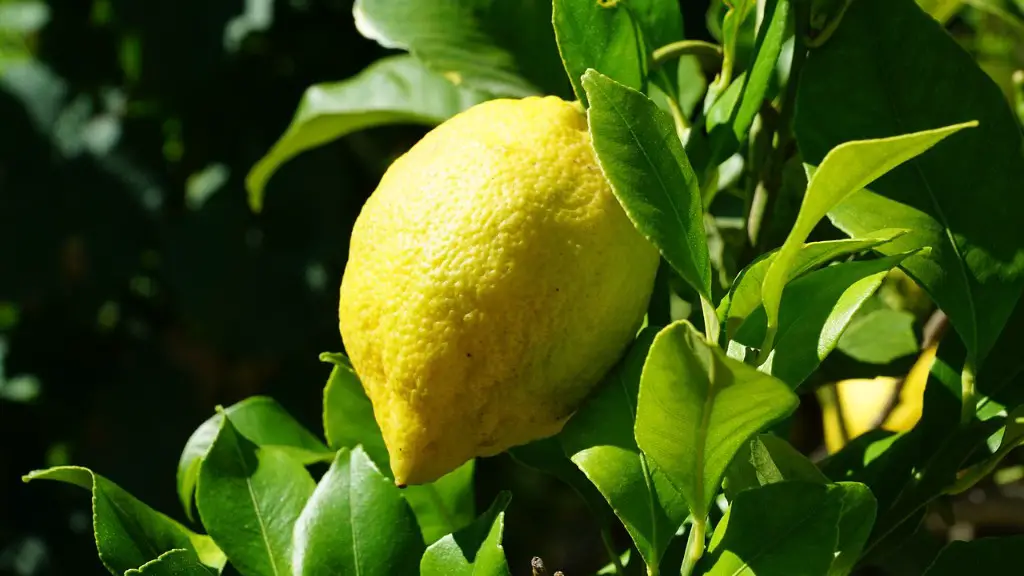The lemon tree (Citrus limon) is a species of small evergreen tree in the flowering plant family Rutaceae and is one of citrus fruits most widely cultivated. It has many culinary and non-culinary uses. The tree’s ellipsoidal yellow fruit is used for culinary and non-culinary purposes throughout the world, primarily for its juice, which has both culinary and cleaning uses. The origin of the lemon tree is uncertain, though it is largely believed to have originated in South or Southeast Asia. It is known to have been cultivated in ancient Rome, and it probably entered Europe during the time of the Roman Empire.
The scientific name for the lemon tree is Citrus limon. Citrus is the class of flowering plants in the single family called Rutaceae, which includes several hundred species. Limon is derived from the Latin word limonem, meaning lemon, and has been used to refer specifically to this species since the 1700s. This species is believed to be the result of natural hybridization and was probably born in South or Southeast Asia.
The lemon tree can grow to be 10–20 ft high and has thorns. Its shiny dark green leaves are oval and 4–8 cm long. Its white flowers are 1 cm in diameter and have five petals. The tree’s fruit is an ellipsoidal yellow acid berry which is 2–3 inches in diameter and has a thick and bitter rind. Its juice contains various chemicals including citric acid and limonene, an essential oil that gives the fruit its distinct aroma.
The lemon tree produces fruits all year round, although it peaks during spring and summer. Lemons can be eaten fresh, made into juice, used in cooking and baking, or used as a garnish in drinks. Other uses of lemons include making lemonade, tea, medicines, beauty products, and cleaning products. It is believed that consuming lemon can reduce the risk of certain diseases and improve overall health.
The lemon tree prefers warm and sunny climates and is sensitive to cold temperatures. Lemons require lots of water, but not too much, and mulching is recommended to keep the soil moist. They are best grown in a container and should be fertilized regularly with a commercial citrus fertilizer or compost. Pruning is necessary for good form and to keep the tree healthy.
Uses of Lemon Tree
The lemon tree has various culinary and non-culinary uses. It is one of the most versatile fruits available, with its juice and rind being used for various dishes, drinks, desserts, and even cleaning products. Lemon juice is a popular ingredient in many recipes and sauces, as it balances out and enhances the flavors of other ingredients, as well as adding bright citrus aroma. Lemon juice is also used in dressings, marinades, and beverages such as lemonade. The lemon rind is often used to add flavor to cakes and desserts, as well as savory dishes. It is also used to make herbal teas.
Lemons can also be used for other non-culinary purposes. Lemon juice has natural antiseptic, bleaching, and degreasing properties, making it a great natural cleaning product. When mixed with water, it can be used to clean surfaces, remove stains, and get rid of unpleasant smells. Lemon juice has also been used topically as a natural skin treatment and hair product, as it is believed to reduce scars, pimples, and dandruff. Additionally, it is used as a germicide, whitener, and astringent for various medical purposes.
In essence, the lemon tree is a highly useful and versatile plant. Its scientific name is Citrus limon, and it has a wide range of uses ranging from culinary to non-culinary. Its juice and rind can be used in various dishes and drinks, cleaning products, and for medicinal purposes. It prefers warm and sunny climates, and regular pruning and fertilizing are recommended to keep the tree healthy.
Health Benefits of Lemon Tree
The lemon tree is rich in many essential vitamins, minerals, and phytochemicals, making it a great choice for promoting overall health and wellbeing. Its juice is high in vitamin C and other antioxidants, which help to protect the body from free radicals and reduce the risk of certain diseases. It is also a good source of folate, vitamin B6, calcium, magnesium, and potassium. Additionally, lemons contain compounds such as flavonoids and limonoids, which have powerful anti-inflammatory, antiviral, and anticancer properties.
Consuming lemons can have many health benefits. It is believed to boost the immune system, reducing the occurrence of infections and diseases. It can also help to reduce inflammation and improve the digestive system. Additionally, lemons can help to improve skin health, lower the risk of obesity, protect heart health, and reduce the chance of developing diabetes. Lemons are also thought to help improve cognitive function, reduce the risk of certain types of cancer, and reduce risk of kidney stones.
In summary, the lemon tree has a variety of health benefits. Its scientific name is Citrus limon, and it is rich in essential vitamins, minerals, and phytochemicals. Consuming it can boost the immune system, reduce inflammation, and improve various aspects of health, such as digestive health, skin health, heart health, and cognitive function. Regularly consuming lemons can be a great way to get important nutrients and improve overall health.
Nutritional Value of Lemon Tree
The lemon tree is an excellent source of many essential vitamins and minerals. A single lemon contains about 30 calories and is high in many vitamins and minerals, such as vitamin C, folate, potassium, and calcium. It also contains other beneficial compounds, such as flavonoids, limonoids, and antioxidants, which can help protect the body from free radicals and reduce the risk of certain diseases. In addition, lemons are a good source of dietary fiber, which is important for digestion, regularity, and overall health.
The juice of a lemon is a great source of vitamin C, containing about 24% of the recommended daily value in one cup. Vitamin C is important for strong immunity and overall health. It is also involved in collagen production and is needed for wound repair. Additionally, lemons are a good source of folate, which plays an important role in heart health, cognitive development, and reduced risk of certain diseases. They are also a good source of potassium, which helps to regulate blood pressure, reduce water retention, and promote overall kidney health.
In conclusion, the lemon tree is a great source of essential vitamins and minerals. Its scientific name is Citrus limon and it is high in many essential nutrients, such as vitamin C, folate, potassium, and calcium. Additionally, it contains other beneficial compounds and dietary fiber, which can help to improve overall health. Consuming lemons on a regular basis can be a great way to get important nutrients and improve overall health.
Environmental Impact of Lemon Tree
The lemon tree has many benefits and can be grown successfully in many climates. However, the cultivation and growth of this species can have a negative impact on the environment. The acidity of lemons can be damaging to certain soil types and can deplete nutrients in the soil. Additionally, the abundance of acidic fruits produced by lemon trees can acidify streams, rivers, and other bodies of water, making them uninhabitable for certain species of fish and other aquatic life.
In addition, the cultivation of lemon trees can be damaging to local wildlife. Long rows of trees can serve as barriers for animals, disrupting their migratory patterns. Additionally, the widespread cultivation of lemon trees in some areas can reduce access to resources for animals, such as trees for shelter and food sources. This can have a devastating impact on local wildlife and can reduce biodiversity in some areas.
In essence, the cultivation and growth of lemon trees can have both positive and negative environmental impacts. The scientific name for the lemon tree is Citrus limon, and it has a wide range of uses and beneficial qualities. However, its cultivation can be damaging to local wildlife and its acidic fruits can acidify soils and water systems. It is important to weigh the pros and cons of cultivating lemon trees before making a decision.
Safety of Lemon Tree
The lemon tree is generally safe for people to consume. The juice of lemons contains citric acid and can be quite sour, so it important to dilute it with water before drinking it. Additionally, consuming too much lemon juice or lemon rind can have adverse effects, such as stomach upset, bloating, and heartburn. It is also important to note that lemon juice and lemon rind can both be irritating to the skin and can cause contact dermatitis in some people.
Additionally, lemons contain a compound called psoralen, which can cause sensitivity to sunlight and rashes. It is important to wear protective clothing and sunscreen if consuming lemon juice or rind before going out in the sun. Lemons are also acidic and can damage enamel on teeth, so it is best to drink lemon juice through a straw or brush teeth after consuming it.
In summary, the lemon tree is generally safe for people to consume. Its scientific name is Citrus limon, and its juice and rind can be used in various dishes and drinks, cleaning products, and for medicinal purposes. It is important to be aware of the risks when consuming lemon juice or rind, as it can be irritating to the skin and has acidic properties that can damage teeth. Additionally, it can cause sensitivity to sunlight. With proper caution, lemons can be consumed safely.





